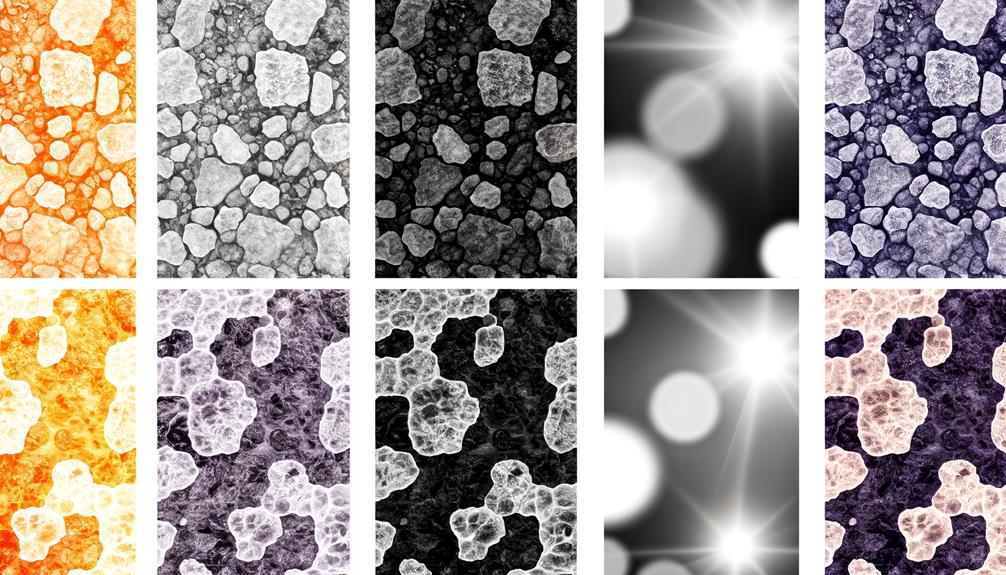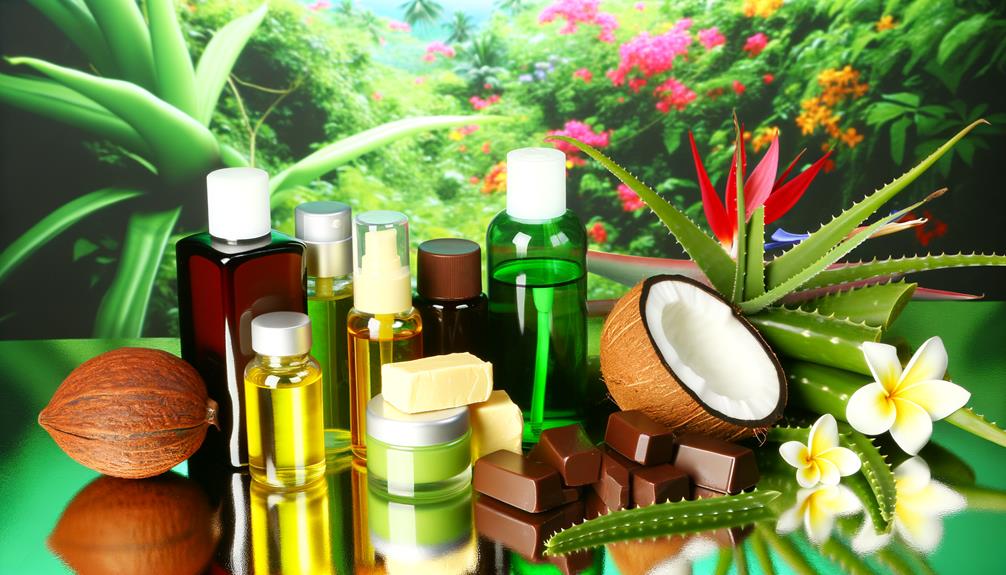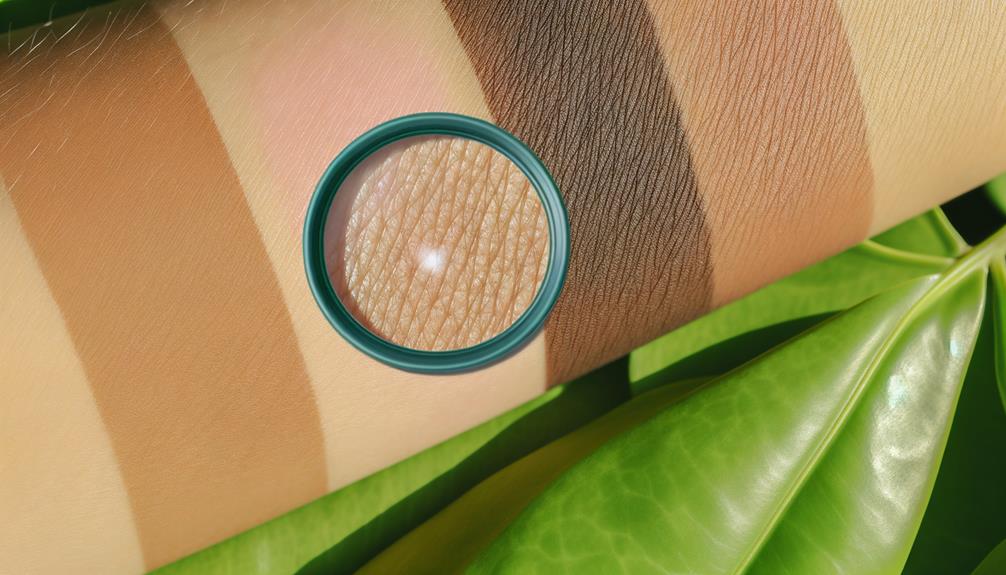You've probably heard that melanin is your skin's natural armor against the sun's harmful rays, but have you considered what that really means for your skincare routine? While melanin indeed offers some protection, it's not an impenetrable shield. Understanding how to optimize this advantage is crucial, especially when myths about melanin can lead to complacency. What steps should you take to support and enhance your skin's natural defenses? Let's explore the essential practices that not only protect but also nurture your melanin-rich skin, ensuring it remains healthy and resilient.
Understanding Melanin's Role

Melanin's role in the skin is both protective and functional, acting as a natural defense mechanism against ultraviolet (UV) radiation. As you delve into the intricacies of melanin, you'll find it's a complex polymer derived from the amino acid tyrosine.
Melanin production occurs within specialized cells known as melanocytes, located in the stratum basale of the epidermis. These cells synthesize melanin through a process called melanogenesis, which is crucial for determining skin pigmentation.
Understanding the regulation of melanin production is vital for comprehending its role in skin health. When UV radiation penetrates the skin, it triggers an increase in melanin synthesis as a protective response. This process is tightly regulated by several factors, including genetic determinants and hormonal influences like melanocyte-stimulating hormone (MSH).
The quantity and type of melanin produced—eumelanin or pheomelanin—directly influence the color and tone of your skin.
Skin pigmentation, resulting from the distribution and concentration of melanin, serves as a critical barrier against photodamage. By absorbing and dissipating UV radiation, melanin minimizes the risk of cellular damage and mutations.
Therefore, understanding melanin's role is essential for appreciating its significance in dermatological health.
Benefits of Melanin in Skin
A key benefit of melanin in the skin is its ability to provide a robust defense against ultraviolet (UV) radiation, thereby reducing the risk of skin cancer. Melanin acts as a natural photoprotective barrier, effectively absorbing and dissipating harmful UV rays. This protective function is directly linked to the density and distribution of melanin production in your skin. Higher melanin levels are associated with increased UV-filtering capacity, highlighting the importance of skin pigmentation in safeguarding your skin's health.
Beyond UV protection, melanin has antioxidative properties, neutralizing free radicals generated by UV exposure and environmental stressors. This reduces oxidative stress, limiting cellular damage and preserving skin integrity.
Your skin pigmentation also plays a role in thermoregulation, as melanin influences heat absorption and dissipation, maintaining optimal skin temperature.
Importantly, melanin production can help mitigate photoaging effects, such as wrinkles and age spots, by maintaining collagen and elastin integrity. This means that your skin not only looks better but also functions more effectively over time.
Common Myths About Melanin

Misconceptions surrounding melanin often lead to misunderstandings about its role and effects on skin health. One prevalent melanin myth is the belief that melanin-rich skin is impervious to damage. While it's true that higher melanin content offers some protection against ultraviolet (UV) radiation, it doesn't render the skin invulnerable. Individuals with higher melanin levels can still experience sunburn, photoaging, and even skin cancer.
Another common skin misconception is that melanin determines skin tone alone. Melanin is indeed the primary pigment responsible for skin color, but it also plays a crucial role in protecting against oxidative stress and maintaining skin integrity. It contributes to immune responses and influences the skin's overall physiology.
There's also a misunderstanding that melanin-rich skin doesn't require hydration. This is another melanin myth. All skin types need adequate moisture to maintain healthy barrier function and elasticity.
Dehydration can lead to compromised skin function and increased susceptibility to environmental stressors.
Sun Protection for Melanin-Rich Skin
Understanding sun protection for melanin-rich skin is crucial for maintaining dermal health. Despite the higher concentration of melanin providing some natural defense against ultraviolet (UV) radiation, it's not a substitute for effective sun protection measures.
You should know that prolonged UV exposure can lead to photodamage, hyperpigmentation, and even skin cancer, irrespective of your skin's melanin content.
Proper sunscreen application is essential. Choose a broad-spectrum sunscreen with an SPF of at least 30. This will help shield your skin from both UVA and UVB rays.
Apply the sunscreen generously to all exposed areas of skin 15 minutes before sun exposure. Reapply every two hours, or more frequently if you're swimming or sweating.
Moreover, consider using physical barriers like hats and clothing to further reduce UV exposure. Remember, melanin may reduce the risk of sunburn, but it doesn't eliminate it.
Regularly assess your skin for any changes or new growths, and consult a dermatologist if needed. By implementing these sun protection strategies, you can safeguard your skin's health while minimizing the risk of adverse effects from UV exposure.
Nourishing Skincare Ingredients

While melanin offers some protective benefits, your skin still requires targeted nourishment to maintain optimal health. To enhance your skin's resilience, consider integrating hydrating oils and exfoliating acids into your skincare regimen.
Hydrating oils, such as jojoba and argan oil, provide essential fatty acids that bolster the skin's barrier function, preventing transepidermal water loss. This hydration support is crucial in maintaining the skin's elasticity and suppleness.
Exfoliating acids, like alpha hydroxy acids (AHAs) and beta hydroxy acids (BHAs), play a vital role in cell turnover. AHAs, such as glycolic and lactic acid, work on the skin's surface to dissolve dead skin cells, promoting a brighter and more even complexion. Meanwhile, BHAs, like salicylic acid, penetrate deeper into the pores, effectively reducing congestion and minimizing acne formation.
Employing these acids can help mitigate hyperpigmentation, a common concern in melanin-rich skin, by accelerating the skin's natural renewal process.
To harness the full benefits, apply hydrating oils post-cleanse to lock in moisture, and use exfoliating acids sparingly, about two to three times a week, to prevent over-exfoliation. With precise application, these ingredients build a formidable defense against environmental stressors.
Diet and Hydration Tips
In addition to topical skincare, maintaining a balanced diet and proper hydration can significantly enhance your skin's health and appearance. Consuming nutrient-dense foods rich in antioxidants, vitamins, and essential fatty acids can bolster your skin's barrier function and promote melanin production.
Integrate superfood smoothies into your daily regimen, incorporating ingredients like spinach, kale, and blueberries, which provide a robust blend of vitamins A, C, and E. These antioxidants help reduce oxidative stress and support skin cell regeneration.
Hydration plays a pivotal role in maintaining skin turgor and elasticity. Implement hydration hacks, such as setting reminders to drink water throughout the day or infusing your water with slices of cucumber and lemon to enhance flavor and encourage consumption. Proper hydration aids in maintaining the skin's moisture balance and facilitates the removal of metabolic waste products.
Additionally, consider including omega-3 and omega-6 fatty acids in your diet, found in sources like flaxseeds and walnuts. These compounds modulate inflammatory responses and enhance the lipid barrier of the skin.
Lifestyle Habits for Healthy Skin

To achieve and maintain healthy skin, integrating strategic lifestyle habits is essential. Prioritizing consistent hydration habits significantly impacts your skin's health. Consume a minimum of 2 liters of water daily to facilitate optimal dermal hydration and maintain skin turgor. Adequate hydration enhances transepidermal water loss regulation, promoting a resilient skin barrier.
Complement water intake with foods high in water content, such as cucumbers and watermelon, to further augment hydration levels.
Furthermore, effective stress management is crucial for maintaining skin integrity. Chronic stress elevates cortisol levels, which can dysregulate sebaceous gland activity, leading to increased sebum production and potential acneiform eruptions.
Implementing regular mindfulness practices, such as meditation or yoga, can mitigate cortisol-induced skin inflammation. Engage in at least 20 minutes of moderate physical activity daily to enhance endorphin release, contributing to improved psychodermatological health.
Sleep hygiene shouldn't be overlooked, as it plays a pivotal role in skin recovery and repair. Ensure you achieve 7-9 hours of uninterrupted sleep per night to support nocturnal skin regeneration processes.
Tailoring Skincare Routines
Achieving healthy skin isn't solely about lifestyle habits; personalizing your skincare routine is equally important. Customized regimens cater specifically to your skin type, ensuring optimal results.
First, identify whether you have oily, dry, combination, or sensitive skin. This classification forms the foundation for selecting appropriate formulations. For instance, those with oily skin might benefit from non-comedogenic products, which prevent pore blockage, while individuals with dry skin should prioritize emollients to maintain hydration.
Incorporate active ingredients known to address specific concerns. Alpha hydroxy acids (AHAs) can exfoliate and brighten, making them suitable for oily skin types prone to hyperpigmentation. Conversely, hyaluronic acid is ideal for dry skin, providing moisture retention without clogging pores.
It's crucial to apply products in a sequence that enhances absorption, typically starting with thinnest to thickest consistency. Conduct patch testing before introducing new products to your regimen to avoid adverse reactions.
Adapt your routine based on seasonal changes; for instance, increase moisturization during colder months when skin tends to lose more moisture. By following a methodical approach, you ensure that your skincare regimen is both effective and tailored specifically to your skin's unique requirements.
Monitoring Skin Changes

Regular monitoring of skin changes is crucial for maintaining a healthy complexion and adapting your skincare regimen effectively. To accurately assess your skin's health, engage in systematic skin condition tracking. This involves documenting alterations in texture, pigmentation, moisture levels, and sensitivity. By maintaining a skin journal or utilizing digital tracking apps, you'll identify patterns and discern triggers related to environmental factors or lifestyle habits.
Understanding seasonal changes is vital, as your skin's requirements fluctuate with temperature and humidity variations. For instance, colder months might exacerbate dryness and necessitate richer moisturizers, while warmer seasons could increase oil production, prompting a switch to lighter formulations. Regularly evaluate your skin's response to these shifts, adjusting your products accordingly for optimal results.
Pay attention to any sudden or persistent changes, such as unusual discoloration, new moles, or alterations in existing ones. These could be indicative of underlying conditions requiring dermatological evaluation.
Employ techniques such as the ABCDE method (Asymmetry, Border, Color, Diameter, Evolving) to scrutinize any atypical features. By integrating meticulous skin condition tracking and acknowledging seasonal changes, you'll enhance your ability to maintain resilient, balanced skin over time.
Conclusion
In understanding melanin's protective role, it's crucial to dispel myths and recognize that melanin-rich skin still requires diligent UV protection. Apply broad-spectrum sunscreen daily to prevent photodamage. Integrate hydrating and exfoliating agents, like hyaluronic acid and alpha hydroxy acids, to maintain skin barrier integrity. Prioritize a diet rich in antioxidants and stay hydrated to support dermal health. Regularly assess your skin for changes, and tailor your skincare routine to ensure optimal protection and nourishment.


